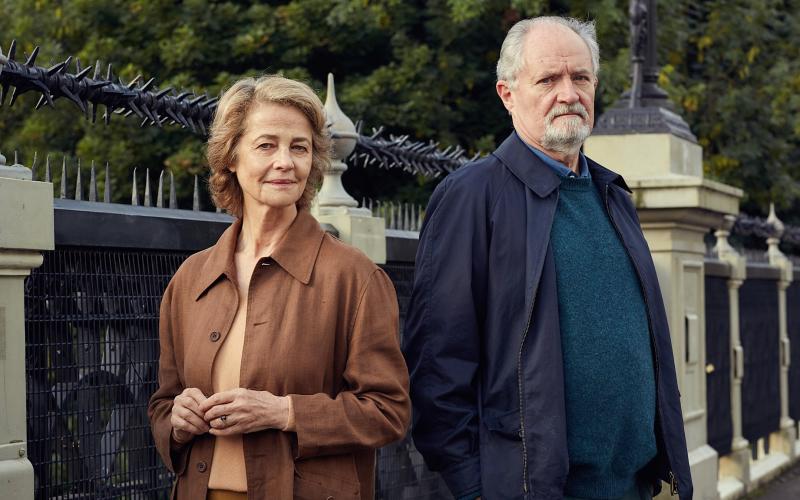The Sense of an Ending review – an enigmatic journey through the past | reviews, news & interviews
The Sense of an Ending review – an enigmatic journey through the past
The Sense of an Ending review – an enigmatic journey through the past
Jim Broadbent shines in adaptation of Julian Barnes novel

Julian Barnes’s 2011 novel The Sense of an Ending teased the brains of many a reader with its split time frame and ambiguous conclusion. It was the sort of thing that the interiorised world of fiction can do surpassingly well, and Barnes had handled it skilfully enough to carry off the Man Booker Prize.
Director Ritesh Batra’s film treatment offers many incidental pleasures, including its naturalistic London locations and Jim Broadbent’s gruff, minor-key portrayal of the central character, Tony Webster. However, though his are the eyes through which we view the story, he isn’t necessarily the best-placed person for the job, since there is much he has either forgotten or never knew in the first place. The subtle ebb and flow of growing older and reflecting wistfully on roads not taken may drift evocatively across the page, but it’s tough going making them work cinematically, even with a strong cast that also features Harriet Walter as Tony’s ex-wife Margaret, Michelle Dockery (pictured below) as his pregnant daughter Susie and Charlotte Rampling as the grown-up version of Veronica Ford, Tony’s erstwhile girlfriend from the Sixties.
 The modern-day Tony has become a man of fixed habits and shrunken horizons. He runs a small shop in Clapham where he sells vintage Leica cameras, but he makes no effort to endear himself to customers, nor do we see any evidence that he has the slightest interest in photography. He seems to have few friends, and rudely ignores the daily greetings from his cheerful Asian postman. His daughter calls him “Mudge”, which is short for curmudgeon.
The modern-day Tony has become a man of fixed habits and shrunken horizons. He runs a small shop in Clapham where he sells vintage Leica cameras, but he makes no effort to endear himself to customers, nor do we see any evidence that he has the slightest interest in photography. He seems to have few friends, and rudely ignores the daily greetings from his cheerful Asian postman. His daughter calls him “Mudge”, which is short for curmudgeon.
Then Tony’s comfort zone is invaded by the arrival of a solicitor’s letter, informing him that he has been left a sum of money and a diary by Sarah Ford, Veronica’s mother (Emily Mortimer). However, when he tries to take possession of the diary, it turns out that Veronica has it but won’t send it on to him. Tony grows increasingly indignant (“but it’s my property!”), and his quest for the bequest eventually leads him to track down Veronica, who he hasn’t seen in decades.
All of this is a mechanism whereby Tony reviews his past, mopes over what might have been, and is eventually jolted out of his late-middle-aged ossification by revelations about what really happened back in his youth. Central to this was the suicide of his best friend from school, Adrian (Joe Alwyn), who had stolen Veronica away from him – though her relationship with Tony seemed to involve little more than her refusing to have sex with him – and who was the author of the missing diary (below, Broadbent and Harriet Walter). Batra and screenwriter Nick Payne are frugal with the actualité, but Tony is forced to face at least one startling revelation about Veronica and her family, while his own culpability in the disasters of the past may have been greater than he’d care to remember. Interestingly, the flashback scenes to the Sixties are the most involving in the movie. Tony’s life with his public school classmates, all of them bristling with glib academic intelligence but none of the emotional kind, rings all too true, and Matthew Goode is excellent as their teacher Mr Hunt, who likes to lob a cricket ball to whichever boy he wants to answer a question in class. A sense of a change in the cultural wind is nicely caught in clothes, decor and music by the likes of The Troggs and Nick Drake, and when the younger Tony (Billy Howle) visits Veronica’s family, the hints of dangerous decadence behind their middle-class facade are like time-bombs waiting to unleash havoc.
Batra and screenwriter Nick Payne are frugal with the actualité, but Tony is forced to face at least one startling revelation about Veronica and her family, while his own culpability in the disasters of the past may have been greater than he’d care to remember. Interestingly, the flashback scenes to the Sixties are the most involving in the movie. Tony’s life with his public school classmates, all of them bristling with glib academic intelligence but none of the emotional kind, rings all too true, and Matthew Goode is excellent as their teacher Mr Hunt, who likes to lob a cricket ball to whichever boy he wants to answer a question in class. A sense of a change in the cultural wind is nicely caught in clothes, decor and music by the likes of The Troggs and Nick Drake, and when the younger Tony (Billy Howle) visits Veronica’s family, the hints of dangerous decadence behind their middle-class facade are like time-bombs waiting to unleash havoc.
It's unfortunate that the past should be both a foreign and a more fascinating country. Batra's decision to leave us with a sense that Tony is belatedly coming to terms with the mundane present isn't quite the pay-off that the movie needs.
The future of Arts Journalism
You can stop theartsdesk.com closing!
We urgently need financing to survive. Our fundraising drive has thus far raised £49,000 but we need to reach £100,000 or we will be forced to close. Please contribute here: https://gofund.me/c3f6033d
And if you can forward this information to anyone who might assist, we’d be grateful.

Subscribe to theartsdesk.com
Thank you for continuing to read our work on theartsdesk.com. For unlimited access to every article in its entirety, including our archive of more than 15,000 pieces, we're asking for £5 per month or £40 per year. We feel it's a very good deal, and hope you do too.
To take a subscription now simply click here.
And if you're looking for that extra gift for a friend or family member, why not treat them to a theartsdesk.com gift subscription?
more Film
 London Film Festival 2025 - crime, punishment, pop stars and shrinks
Daniel Craig investigates, Jodie Foster speaks French and Colin Farrell has a gambling habit
London Film Festival 2025 - crime, punishment, pop stars and shrinks
Daniel Craig investigates, Jodie Foster speaks French and Colin Farrell has a gambling habit
 I Swear review - taking stock of Tourette's
A sharp and moving tale of cuss-words and tics
I Swear review - taking stock of Tourette's
A sharp and moving tale of cuss-words and tics
 A House of Dynamite review - the final countdown
Kathryn Bigelow's cautionary tale sets the nuclear clock ticking again
A House of Dynamite review - the final countdown
Kathryn Bigelow's cautionary tale sets the nuclear clock ticking again
 theartsdesk Q&A: Idris Elba on playing a US President faced with a missile crisis in 'A House of Dynamite'
The star talks about Presidential decision-making when millions of lives are imperilled
theartsdesk Q&A: Idris Elba on playing a US President faced with a missile crisis in 'A House of Dynamite'
The star talks about Presidential decision-making when millions of lives are imperilled
 Urchin review - superb homeless drama
Frank Dillane gives a star-making turn in Harris Dickinson’s impressive directorial debut
Urchin review - superb homeless drama
Frank Dillane gives a star-making turn in Harris Dickinson’s impressive directorial debut
 Mr Blake at Your Service review - John Malkovich in unlikely role as an English butler
Weird comedy directed by novelist Gilles Legardinier
Mr Blake at Your Service review - John Malkovich in unlikely role as an English butler
Weird comedy directed by novelist Gilles Legardinier
 Don't Let's Go to the Dogs Tonight review - vivid adaptation of a memoir about a Rhodesian childhood
Embeth Davidtz delivers an impressive directing debut and an exceptional child star
Don't Let's Go to the Dogs Tonight review - vivid adaptation of a memoir about a Rhodesian childhood
Embeth Davidtz delivers an impressive directing debut and an exceptional child star
 One Battle After Another review - Paul Thomas Anderson satirises America's culture wars
Leonardo DiCaprio, Teyana Taylor, and Sean Penn star in a rollercoasting political thriller
One Battle After Another review - Paul Thomas Anderson satirises America's culture wars
Leonardo DiCaprio, Teyana Taylor, and Sean Penn star in a rollercoasting political thriller
 Steve review - educator in crisis
Cillian Murphy excels as a troubled headmaster working with delinquent boys
Steve review - educator in crisis
Cillian Murphy excels as a troubled headmaster working with delinquent boys
 Can I get a Witness? review - time to die before you get old
Ann Marie Fleming directs Sandra Oh in dystopian fantasy that fails to ignite
Can I get a Witness? review - time to die before you get old
Ann Marie Fleming directs Sandra Oh in dystopian fantasy that fails to ignite
 Happyend review - the kids are never alright
In this futuristic blackboard jungle everything is a bit too manicured
Happyend review - the kids are never alright
In this futuristic blackboard jungle everything is a bit too manicured

Add comment